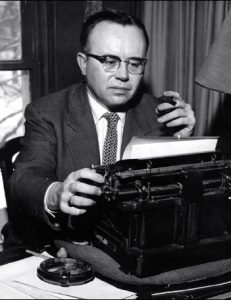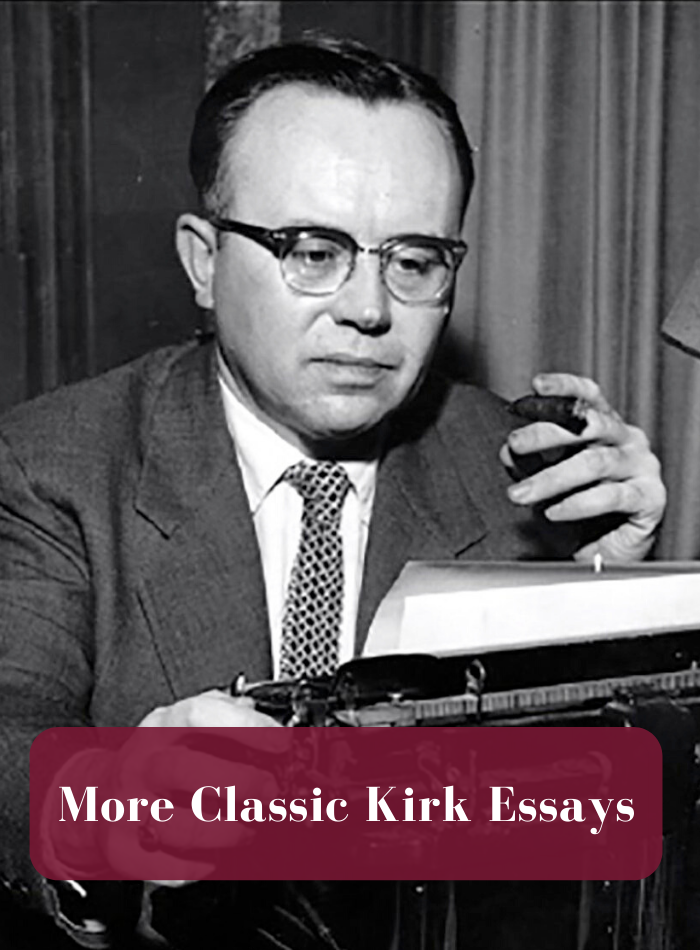 Classic Kirk:
Classic Kirk:
a curated selection of Russell Kirk’s perennial essays
A Note from the Editor
Although Russell Kirk was born and raised in Plymouth, a town near Detroit, his mother’s kin were from a village called Mecosta in rural Michigan. He often spent time there visiting relatives and exploring the trails and lakes in the area. Following the publication of The Conservative Mind in 1953, he bought his ancestors’ property in Mecosta and made it his permanent home.
Mecosta may not seem to offer much to the eyes of the casual passerby, but Kirk draws out its charms and simple enjoyments in this article. As he recounts, a friend once told him, “nobody but you could make romance out of that godforsaken country where you live.” In fact, many of Kirk’s short stories and ghostly tales are set in the half-abandoned lands of the county. Kirk shared his romantic vision of the place with the many visitors to his house, nicknamed “Piety Hill” by the early lumbermen mentioned in this piece. Kirk transformed that appellation into a sign of affection for local place and extended family, derived from the ancient Roman virtue of pietas.
Mecosta County: Where the Country Spirit is Alive and Well
Michigan Living, April, 1987
At the western edge of the old-fangled village of Mecosta, on a glaciated slope above a creek that flows into the Little Muskegon, my family has lived for six generations.
In New York or Washington or Los Angeles, people inquire of me, “You live in a little village in Mecosta County, Michigan? Why? You could live anywhere in the world.”
“It’s my stamping ground,” I tell them. Mecosta has been a depressed, yet not depressing, area ever since the Panic of [18]’93, when the last deforesting occurred. In its simplicity, our county has changed less than has most of America.
Within a six-mile radius of my ancestral property there lie some 40 lakes, big or small, amid second-growth woods. Our house stands not far from the watershed of central Michigan, so that one may canoe eastward along the Chippewa River system or westward along the Muskegon. When I was small, not a deer survived in Mecosta County, now they roam abundant from the big wilderness of Hughes Swamp to the dry uninhabited uplands we call Skyberia.
During my childhood, these countries were Stump Country. An ancestor of mine, Giles Gilbert, lumbered off much of Montcalm and Mecosta counties, and now lies in a fine tomb at the top of Stanton’s graveyard. His nephew, Amos Johnson, was a county probate judge and Mecosta village president and a good deal else here; eventually his Italianate house became mine, until it was destroyed by fire in 1975.
Here, in a venerable-looking but actually new Italianate brick house we built after our great fire, my wife and our four daughters and I, usually with a good many people in our household, live well, content. We enjoy quiet, pure air, and spaciousness.
Several of the ghostly tales published in the three volumes of my short stories are set in Morton Township and Mecosta Country; and some of them are spun out of my family’s uncanny legends. “Russell, you’re the last of the Romantics, and probably the greatest,” a waggish friend once told me, ”because nobody but you could make romance out of that godforsaken country where you live.”
Godforsaken? We Mecostans are not conspicuously prosperous, true. A few years ago Mecosta enjoyed, at least for a year, the distinction of being the Michigan county with the lowest per capita income. But it doesn’t follow that we Stump Dodgers and Sand Hill Savages are an unhappy folk.
The old woods trails and the boulder-strewn streams have their charms, and we are kindly toward one another: for the first six decades of our county’s history, no one was charged with having entered unlawfully an occupied dwelling, except for two or three inebriates who had staggered into someone else’s dwelling under the impression that they had arrived safely home.
Godforsaken? Why, our cheerful region even is favored with pleasant places to dine and lodge. I heartily commend, for one, the Clifford Lake Inn, registered as a historic monument, some six miles west of Stanton, in Montcalm County; well-cooked food, and strong drink, obligingly served to quite late hours in the picturesque room of an unmutilated Michigan summer hotel of the modest sort, old style.
Closer to our village, down a hill road off M-20, one finds the Blue Lake Lodge, three miles west of Mecosta, or two-thirds of the way from Mt. Pleasant to Big Rapids. This is another old-fangled Michigan summer boarding house, charmingly done up, now one of the more interesting new-style bed-and-breakfast places—and a fine beach.
Almost next door to the Blue Lake Lodge is the long established Connor’s Supper Club, with perhaps the finest prospect from its lakeside windows of any Michigan restaurant. …
I don’t mean to imply that Mecostans are gourmets or gourmands. As a species, they are physically vigorous, given to hunting and fishing rather than to the delights of café society. It was Mecosta County’s National Guard company, during the Second World War, that crossed the Owen Stanley Mountains in New Guinea to fall upon the Japanese troops at Buna and Gona.
Although I have owned biggish houses elsewhere in Michigan, and even an ancient picturesque one in Scotland, I do not choose to dwell elsewhere than decayed Mecosta, where the population is but one-fourth so large as it was in my great-grandfather’s time…
At Mecosta I wrote The Conservative Mind on my great-uncle’s 1907 L.C. Smith typewriter; and I mean to be conservatively interred here, in the fullness of time.
Another Michigan writer, Curtis Stadtfeld, born on a family farm between Mecosta and Remus, captures the haunted and haunting quality of Mecosta in his book From the Land and Back. “When we were boys, we used to call it ‘Brigadoon’ and drive over now and then to see if it was still there. Strange winds blow there, and odd sounds are heard in the night. Perhaps the ghosts of the lumbermen are keeping it alive, knowing they will need it later.” Amen to that. Long live the spirits of Mecosta.
Copyright © The Russell Kirk Legacy, LLC
 Classic Kirk:
Classic Kirk: